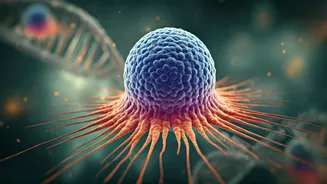AI’s Cancer Breakthrough
Google DeepMind's recent AI model has achieved a significant milestone by unraveling a complex challenge in cancer research. This development marks a substantial
advancement in the application of artificial intelligence to solve intricate scientific problems. The AI's ability to analyze and interpret complex biological data has revealed insights into the mechanics of cancer that were previously inaccessible. The achievement is a testament to the growing role of AI in medical research, demonstrating its power to accelerate discoveries and enhance our understanding of diseases like cancer. This could pave the way for more effective treatments and earlier detection methods, greatly benefiting the medical community and patients worldwide.
DeepMind's Innovative Approach
The innovative approach employed by Google DeepMind involves the use of advanced algorithms and machine learning techniques. The AI model was trained on extensive datasets of biological information, allowing it to identify patterns and relationships that might be missed by human researchers. This capability to process vast amounts of data and recognize subtle correlations has been crucial to its success. DeepMind's methodology underscores the potential of AI tools in uncovering new knowledge and promoting collaborative research. The AI's precision and capacity to handle large-scale data analyses have led to an improved understanding of cancer's underlying mechanisms. This ultimately opens doors for new research directions and offers hope for improved patient care in the future.
Unveiling Cancer Mysteries
The AI’s work has successfully unlocked a crucial aspect of cancer, helping to resolve one of its complex puzzles. This accomplishment sheds light on the intricacies of the disease. This new understanding represents a giant step in the field, helping scientists interpret the fundamental processes of cancer in far greater detail. This deeper comprehension is expected to enhance research efforts and provide the foundation for novel treatment strategies. By pinpointing key details, the AI's contribution is expected to facilitate the development of better and more targeted therapies. The overall impact is projected to accelerate progress in cancer research, bringing us closer to better methods for diagnosis and management of the disease.
Implications for Treatment
The findings from Google DeepMind's AI model have significant implications for cancer treatment. With a better grasp of the disease's mechanisms, researchers can now focus on developing targeted therapies designed to disrupt cancer cells more effectively. This could lead to a reduction in the side effects associated with conventional treatments and enhance patient outcomes. Moreover, this AI-driven approach is expected to lead to earlier cancer detection, allowing for quicker intervention. The advancements also provide hope for personalized medicine, where treatments are adjusted based on an individual's genetic and molecular makeup. The goal is to move towards treatment strategies that are more effective, personalized, and, ultimately, improve the quality of life for cancer patients.
Future Research Pathways
The success of Google DeepMind's AI in cancer research opens up exciting paths for future investigations. Scientists can now utilize the AI model to explore additional areas of cancer biology, accelerating the rate of discovery. The model can be applied to different types of cancer to identify commonalities and differences, leading to a more thorough understanding of the disease. Collaboration between AI experts, biologists, and medical researchers will be crucial for the continued advancement. This partnership will foster innovation and create new avenues for tackling complex medical challenges. The ongoing research efforts, backed by advanced AI, will improve our ability to combat cancer and create a healthier future.













